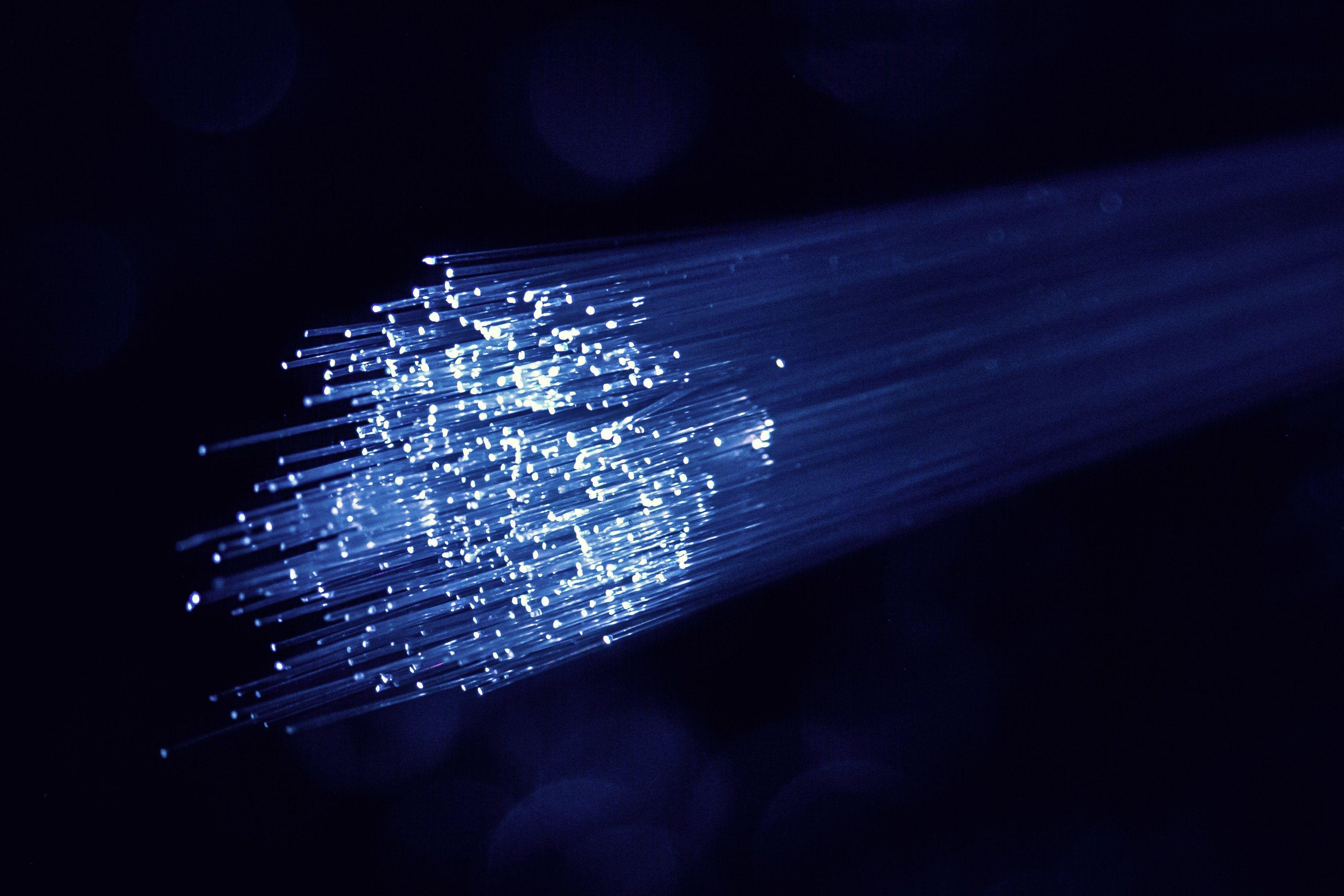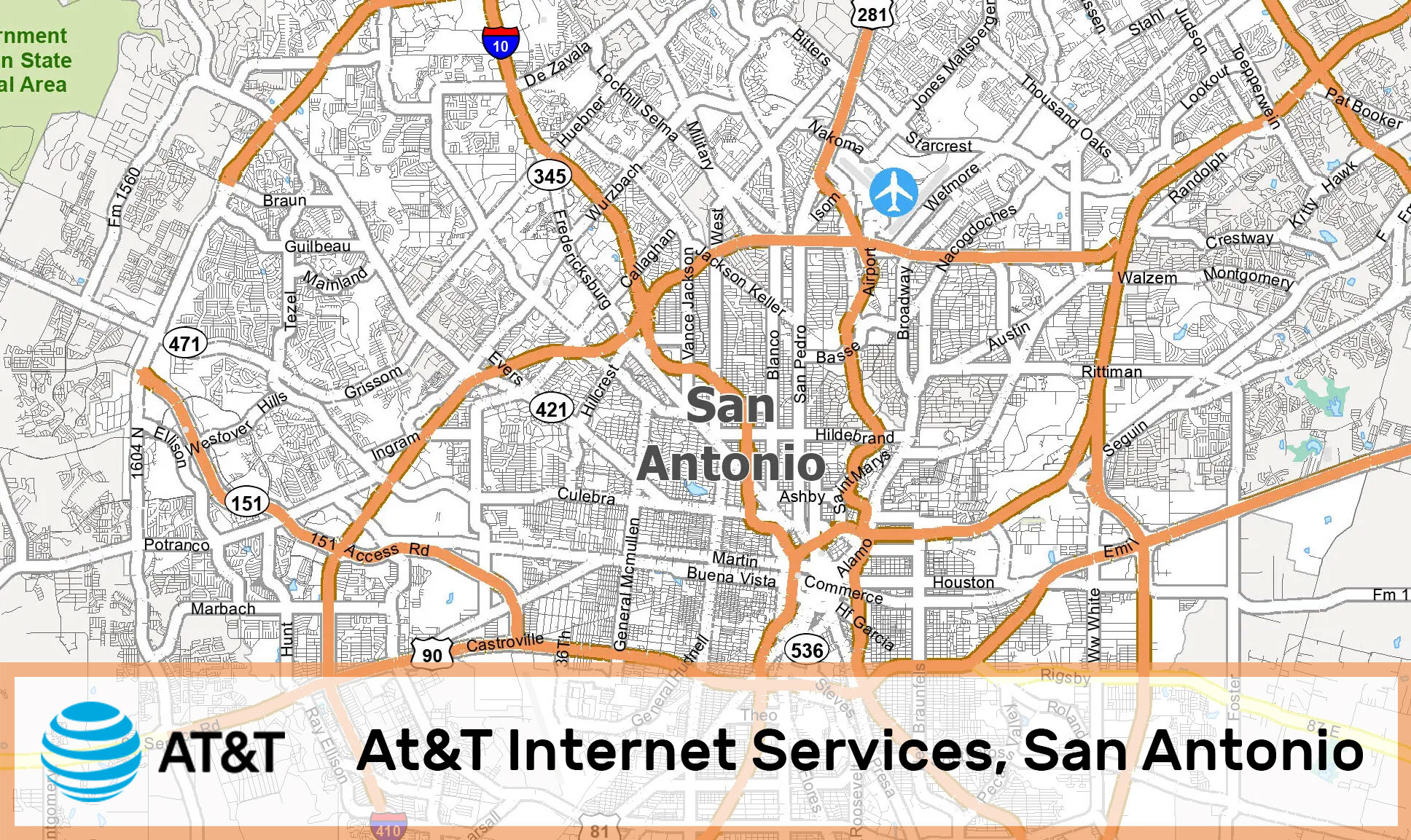Whether you're relocating to the San Antonio Austin corridor, or are already living here but need the best internet provider in the area, we can offer some great suggestions. Our database of the best local internet deals ensures you'll always end up with some of the fastest internet out there, for less than you might think.
15 May, 2024 | Posted by: Pablo Mendoza
Category: Business Internet, Cable, Entertainment, Deals & Packages, Internet, Service Providers, Streaming, Technology | No Comments

Whether you're relocating to the San Antonio Austin corridor, or are already living here but need the best internet provider in the area, we can offer some great suggestions. Our database of the best local internet deals ensures you'll always end up with some of the fastest internet out there, for less than you might think.
Compare internet providers in San Antonio and the surrounding area to find the option that's going to work best for your circumstances.
Depending on what you're looking for, there are some great internet plans in Boerne. (Trust me, I actually live here) If cost is a consideration, the fastest internet service currently available belongs to AT&T fiber internet which boast speeds of up to 1000 mbps. Now if you are further in the hill country and AT&T internet isn't an option, Satellite internet service like Viasat and Hughesnet are great options. Satellite internet service usually has lower speeds and data caps but is absolutely a good option for those who prefer to live outside of the city.
If speed is a consideration, you'll want to opt for the AT&T Internet package. At $49.99 a month, this package delivers a super-fast 300mgps, way ahead of the next speediest (Metronet - $49.95 a month for 200mbps upload and download speed).
Other providers in the area include DIRECTV, VIASAT, HughesNet, Spectrum, and Rise Broadband
For residents who want internet providers in New Braunfels that offer a good level of customer care, Centurylink and AT&T are both 4-star options, putting them near the top of the pile when it comes to customer satisfaction.
Spectrum internet's promotional rate of $29.99/ month for the first twelve months is by far the cheapest price, but with a download speed of a blazing fast 100 mbps, it's going to be the fastest and best internet option available in New Braunfels.
If you want speed, we recommend AT&T. Not only is their 300mgps speed very respectable, they also offer TV as part of their monthly package rate of $49.99.
Do you have a preference for how your internet is delivered to your home? The main types of internet package are DSL, Fiber, Cable, and Satellite options. DSL and cable internet are most commonly available in Schertz. Providers include AT&T, Viasat, Hughesnet and Spectrum. The only downside of DSL or cable is that the bandwidths are relatively narrow, which means speed can be an issue at times, particularly if there are a number of subscribers in Schertz who all share your cable bandwidth.
If you're not sure which provider is going to give you the best internet service in Schertz, we're always happy to talk through your options with you.
Satellite internet providers such as DirecTV or ViaSat may be laggy at times. Fiber broadband provision is rare, and not currently available in Schertz.
Schertz is an up-and-coming town that's currently undergoing an urban revival. If you're looking for a neighborhood on the way up, Schertz ticks all the right boxes.
Commentators expect that San Marcos, along with New Braunfels, is likely to be a powerhouse for growth and innovation in the San Antonio Austin corridor.
It's expected that soon San Marcos is going blend into the other towns and cities in the corridor, contributing to the vibrant nature of the corridor.
Whilst the fastest internet service in San Marcos is probably available from AT&T at the current time, it's likely that the continuing growth of the corridor will encourage providers to invest in more internet infrastructure in the area. This means that new arrivals to San Marcos are likely to enjoy ever-improving broadband services at time goes on.
Enjoying a beautiful location on the Guadalupe River, Canyon Lake is a stunning town to live in. A hub for watersports and fishing, its recreational facilities and low crime rate means it's a perfect place to relocate to.
Canyon Lake benefits from some good schools and a low crime rate. Popular with retirees, it's also a desirable location for families.
The town enjoys excellent broadband coverage from many well-known internet providers, such as COX, DirecTV, HughesNet, and MediaCom.
Buda is a town that has managed to retain its character, at the same time as updating its image and facilities to provide everything needed for a good quality of life in the 21st Century.
There has been a considerable amount of development recently, with new houses providing plenty of options for new arrivals.
When it comes to the best internet service in Buda, you'll be spoiled for choice! With prices starting from less than $20 a month, and broadband speeds of up to 300mgps available, there's an internet provider that's suitable for everyone in Buda.
Looking for the best internet service near me in Kyle? There's plenty of choice from well-known providers in the local area.
Part of the Mountain City conurbation, Kyle is a relatively undeveloped part of the corridor that has enormous potential. If you're moving to Kyle now, it's likely that property prices in the area will rise significantly as redevelopment gets underway.
Packed with historical attractions and beautiful parks, Roundrock is an attractive location that's a great place to spend time in. Famed for its Roundrock Do-nuts, the town also boasts a stunning selection of designer outlets and the mighty Round Rock Express.
New inhabitants of Roundrock can look forward to a good quality of life and plenty of facilities, including some great deals on broadband access and some of the fastest internet options anywhere in the state.
Broadband providers serving Roundrock include DSL, cable, and satellite providers. Whether you want a deal on just broadband or are looking for a package that includes TV and phone, there are some great offers available in Roundrock.
Get in touch with the team here at Konecteaze to discover the best internet deals for residents in the San Antonio Austin corridor.
What are you waiting for? Check the available AT & T Internet Providers in your area through KonnectEaze and enjoy the most reliable internet services.
22 October, 2024 | Posted by: Pablo Mendoza
Category: Deals & Packages, Internet, Service Providers, Streaming, Technology | No Comments

Since its establishment in 1983, AT&T has evolved into one of the premier Internet Service Providers in the United States, offering secure, high-speed internet services across 21 states.
AT&T provides advanced internet solutions with extensive reach in urban and rural areas, including a significant presence in San Antonio through Fiber Optic, DSL, and Fixed Wireless plans.
AT&T's network is designed to be robust and reliable, maintaining high customer satisfaction ratings, especially among fiber optic service users.
AT&T continues to lead in the ISP industry, offering reliable, high-speed internet with a focus on customer satisfaction. Check the availability of AT&T Internet Providers in your area through KonnectEaze.
Finding the fastest Internet service in San Antonio- Austin area can be quite a challenge. You wade through dozens of websites that promise the world only to discover the internet service you want isn't available, is too expensive or just not fast enough. If only there was an easier option.
15 May, 2024 | Posted by: Pablo Mendoza
Category: Deals & Packages, Internet, Service Providers, Streaming, Technology | No Comments

Did you know that 86% of urban areas in the US have access to broadband compared to 81% in rural areas?
The country ranks 11th in the world for broadband speeds yet many users get left behind. That's in part to fiber broadband installations which usually happen within the cities. But what about areas that can't get access to high-speeds?
This article reveals how you can get the fastest Internet possible no matter what city, state, or community you're in.
Read on to discover the benefits of Rise Broadband Internet. Discover how affordable Rise Broadband prices can be. And connect to the Internet speeds you deserve.
Gone are the days of dial-up modems and files taking hours to download.
Modern broadband Internet offers a high-speed connection to the online world. Speeds are measured in Mbps or megabits per second. The higher the number the faster your Internet experience.
Although there's no standard definition of a base broadband speed, aim to reach double-digits. For example, you can download a 10MB file on a 20Mbp connection in under ten seconds.
You'll need an Internet service provider or ISP to get connected. However, they all charge different prices for different speeds. And not all ISPs will cover your location.
One of the best broadband providers is Rise Broadband.
Located in Dallas, Texas, Rise Broadband provides fixed wireless Internet services. Whether you live in a rural or urban setting you can connect from any device.
Rise will install an antenna on your roof and attach a radio receiver. Their hardware connects to a local Access Point tower which in turn links to a fiber junction box. This produces low latency/delays compared to options like satellite.
Rise Internet speeds range from 1Mpbs up to 1Gbps.
They serve a sixteen states that include twenty-six million American homes and businesses. If you can access a minimum of 5Mpbs you can use Rise Broaband's fastest Internet service for HD video streaming.
Rise Broadband has the fastest Internet deal to suit every budget. Three popular high-speed options include:
The Unlimited deal costs $54.95 per month and includes an unlimited amount of downloads. Speeds average 25Mbps and there are no set-up fees.
The 50 Internet Only option grants you speeds of up to 50Mbps for $44.95p/m. That price includes 250GB of data usage and the modem costs $10.99 p/m.
Finding the fastest Internet service is never fun. You wade through dozens of websites that promise the world only to discover they don't cover your area. If only there was an easier option.
KonectEaze lets you find the perfect ISP by simply entering your location.
Our results display download and upload speeds along with pricing and contract lengths. We even show how long it would take to download a movie and 50 photos.
Try our service today and contact Rise Broadband for the best deal.
Internet access in the US varies from state to state and provider to provider. Here are stats to some of the most popular internet providers around today.
15 November, 2024 | Posted by:
Category: Deals & Packages, Reviews, Internet, Service Providers, Streaming, Technology, Tips | No Comments

AT&T, synonymous with innovation in communications, has been a leader in technological advancements for over a century. This article delves into AT&T's transformative journey, emphasizing its milestones and impact on telecommunications, illustrated through an infographic.
Founded in 1885 as a subsidiary of Alexander Graham Bell's company, AT&T was established to build the first long-distance telephone network, connecting distant cities and revolutionizing communication.
In 1915, AT&T completed the first transcontinental telephone call, demonstrating the feasibility of long-distance communications and setting the stage for future connectivity.
AT&T introduced the first commercial mobile telephone service in 1946 but also faced regulatory scrutiny leading to significant antitrust actions, notably the 1982 restructuring after divesting its local Bell operating companies.
Post-divestiture, AT&T was pivotal in the introduction of broadband and early high-speed internet services, influencing the digital technology landscape significantly.
The 21st century saw AT&T expand through mergers, notably acquiring BellSouth in 2006 and Time Warner in 2018, significantly broadening its telecommunications and media operations.
AT&T continues to lead with extensive networks and services, focusing on innovations in 5G technology to support faster and more reliable connections globally.
AT&T’s evolution from a telephone service provider to a global communications and media powerhouse illustrates its vision and adaptability, with a commitment to pushing technological boundaries. Find Internet Deals in My Area | Internet Providers Near Me | KonectEaze
Unsure when to order internet while moving or buying a new home? Learn the best timing to ensure a smooth connection and avoid delays during your move.
15 November, 2024 | Posted by:
Category: Cable, Deals & Packages, Internet, Service Providers, Streaming, Technology, Tips | No Comments

If you're moving soon and are experiencing a little stress on how to pack up and start relocating, you're far from alone. According to recent statistics, about 35.5 million Americans pack their bags and move to a new house each year.
One of the most stressful and essential things about moving to a new home is knowing how and when to start setting up internet there. Several factors go into deciding when internet installation needs to take place, including knowing the specific situation that you're in, the options available to you in your new location, and what providers work best for your individual needs.
Here, we're going to take an in-depth look at some of these essential factors so that you get a clearer picture of when you need to begin installing internet in your new home. Read on to make your moving experience as seamless and stress-free as possible!
The first thing that you need to consider when deciding when to set up an internet connection is the specific situation and circumstances of your move. Internet options are going to differ based on your location and point that you're at in the moving process. Read on to begin thinking about some aspects of relocation that you'll need to consider!
Generally, you have two options when it comes to internet: satellite and cable.
Satellite internet can be accessed from anywhere in the US. It's basically a communications service that's provided through a series of three wireless satellites that work together to bring a connection to your home. In rural areas, this may be your only option since there aren't internet lines everywhere. It's slower and performs fewer functions than cable internet does, but it's something, and it works. It also takes a bit of time to set up, so you'll need to call a provider a few weeks before moving.
In more populated areas, you're likely to have internet options via cable. These are often of superior quality because they connect to a series of digital lines closer to your home than the satellites are. Cable is faster and more efficient, but it costs more than satellite internet does. It also isn't available in many areas of the US.
Cable internet can be set up much faster than satellite can. It will likely only take a couple of days to get it up and running at home. As a result, you can worry about this while you relocate rather than before you do so.
Because cable internet isn't offered everywhere, you're going to need to do specific research on the place that you're moving to. If you're headed to a less populated area, you're unlikely to have as many options as you would in a big city.
If you live in an area that has satellite internet exclusively, you're going to need to set it up sooner rather than later. It takes about two weeks to install these services, so you'll want to plan accordingly. If you wait until the later steps of your move, you're likely to find yourself without internet for a few weeks.
In addition to considering the location you're moving to, you'll need to think about your lifestyle and the urgency of your need for an online connection. Read on to get some ideas of what lifestyle factors may cause you to need an internet connection more quickly than you otherwise would.
If you work at home, you'll need to set up your internet immediately. Not doing so can cause a huge financial strain on you at one of the worst possible times. Moving costs can be pretty high, and you'll need a way to pay them off.
Make sure that you contact an internet provider early- possibly before you even begin to move- and ask them to set up WiFi at your new place. If you wait a long time, you're also more likely to forget to contact them. This could be detrimental to your work life, so get on top of your internet now!
According to psychologists, feeling isolated has incredibly adverse effects on both mental and physical health. In addition to making the risk of depression go up, it also makes you 30% more likely to suffer from a stroke later in life.
If you don't rely on online communications to talk with friends and relatives, you probably could bear to spend a few days waiting for it to get set up. However, most people do require an internet connection to communicate with those they love. If you have friends that live far away from you or are in a long-distance relationship, having internet from the moment you move into your home is essential.
You're going to be stressed out because of the move- don't isolate yourself on top of that!
Keeping children occupied during a move is difficult, and it's even harder if you don't have a TV set up for them to watch.
If you have children, it's essential that you get the internet up and running quickly regardless of your lifestyle. While you unbox your things and organize your new home, setting your child up with a TV show or iPad is a good way to keep them occupied and out of your way.
Using AT&T is a great idea if you have the option to do so. They have a new streaming service, AT&T TV, which is a great alternative to DirecTV. It's faster and has more options so that you don't need to worry about kids getting antsy while their favorite shows are loading.
After you have a rough idea of when you need to start setting up internet in your new home, you'll need to look into the providers that cater to your area. This means doing your research to ensure that your specific needs are met by the provider that you select. Read on for some information on how to find the perfect internet provider to suit your lifestyle and needs!
The first thing that you'll need to do when looking for an internet provider is to research the options that are out there to you. This can become a pretty overwhelming process when you have no assistance- after all, there are so many providers out there, and each one has its own unique features! Luckily, we're here to help, so we've compiled a short list of internet providers that you may be interested in using as well as the features that make each one of them unique.
When choosing an internet service for your home, you can do yourself a huge favor by choosing a full bundle that includes internet, TV, and streaming services. Some packages even offer phone service and data, which is a great way to save on an additional phone bill! When you choose a bundle package, you'll only be paying one price for all the entertainment services that you and your family will use on a daily basis.
This not only means that you'll be saving money, but it also means that you won't need to worry about keeping track of and paying multiple bills. Life is busy and it's easy to get disorganized, especially when you're frantically moving items and unboxing your belongings during relocation. You won't need to worry about logging into many websites to pay your bills when you have a bundle- you'll simply only need to set a reminder and pay once.
When choosing an internet package, one of the most important things to keep in mind is the speed of internet that you need. If you have the luxury of living in a place where you can choose between various cable or satellite providers, you'll need to look into the bandwidth of the internet connection for each provider. You may also want to read reviews of other customers who have chosen different internet services to see which of them are happy (or unhappy) with the speed of their service.
If you have a larger family or you work from home/spend hours out of your day online, you're going to need a faster connection. This is also the case if you stream a lot of video or make many Skype calls. Consider these factors and be realistic about the connection speed that you require.
However, staying within the budget you set is just as important as getting a high-speed connection. If you spend too much money on internet, you may find yourself under a lot of financial strain when paying the other bills you need in your new location. Until the bills come in for the first month of water, electricity, etc, you don't truly know how much these amenities are going to cost you in your new home.
That's why it's important that you stick to your budget when purchasing your first internet plan. If you decide that you have more money than you thought, awesome! You can change things around later. But don't strain yourself right away, especially when you have to deal with immediate moving costs.
There are many factors that go into deciding when to begin setting up internet in your new home. From knowing your situation to considering your lifestyle to researching the providers that cater to your area, there's a lot to think about.
Now that you have an idea of when you need to begin internet installation while relocating, it's time to start researching some of the packages that you can buy. Click here to get more information on internet/TV bundles that you can choose from after moving to your new location. You can also call us at (888) 376-0763 to discuss internet packages with an expert. This is a great way to get help deciding on the right bundle for you.
Have a smooth move!